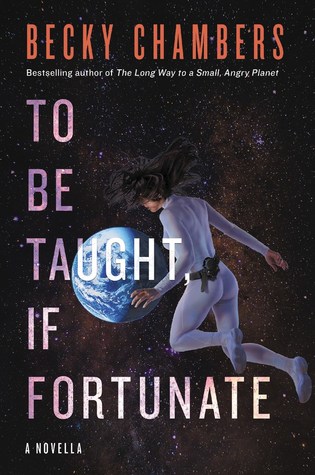- The Good: Hopeful, feel-good scifi exploring exoplanets!
- The Bad: Little dramatic tension
- The Literary: Philosophical questions posed for your consideration
Flight engineer Ariadne O’Neill and three other astronauts embark on a research mission to perform a broad ecological survey on the four habitable worlds in orbit around the red dwarf star Zhenyi (BA-921). Ariadne and her crew sleep between worlds, during which time their biology is altered so it’s more suitable for life in space and on the next planet. Back on Earth, society changes as the decades pass, but the mission continues.
I love the idea that the astronauts change their own biology to explore other worlds. Their work is to study and observe, so instead of the human tradition of terraforming a planet to sustain human life, they preserve the ecosystem of the naturally occurring species. Also, who doesn’t love space exploration? The mission is wonderfully reminiscent of classic Star Trek. The science of this science fiction, while set in space, focuses more on the biology, which is a nice change of pace from physics. From genetics and taxonomy, microorganisms to mammals, and my favorite, amino acid chirality, you’ll get your dose of edutainment.
I also really enjoy the format. Ariadne is writing a letter back to earth, addressing the reader as an someone on Earth who may no longer be aware of her mission. She begins with the tragedy of leaving behind her loved ones and quickly moves to the excitement of exploring new worlds as the astronauts awake from hyper sleep and prepare their first landing, which translates well.
Chambers writes hopeful science fiction with diverse characters. The kind of stuff that makes you feel all warm and fuzzy because everyone is really supportive and nice to each other. That works well in this book because it makes sense among well trained adult astronauts who get along and all want to do science. However, the dramatic tensions that give weight and resonance to a story are lacking here, something I have also noticed in Chambers’ other works.
Also, it bugs me that during the emotional low point of the second act, no one talks to each other. Clearly all of the astronauts are suffering, but they bury their feelings deep inside, which creates an emotional distance from the reader. With rigorous astronaut training, I’m surprised any of them wouldn’t recognize their emotional state and at least log it, if not take action to avert a downward spiral of despair.
Despite the high-level and nit-picky critiques above, I really like that this novella is trying to ask big questions. What’s important to us a species? And just as Ariadne’s mission is crowd-funded, the story is asking for humans to make a decision as a collective. Should we use resources to explore space? Science cannot be done in a vacuum. Science is built on the shoulders of giants, and you’re included.
Recommended for fans of optimistic science fiction!
